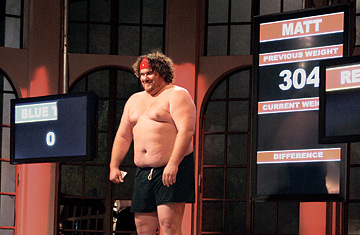
The Biggest Loser
In the 1973 Woody Allen classic Sleeper, Allen's character, a health food store owner, awakes in the future to discover that everything considered bad for you — namely smoking and eating deep-fried foods — was actually beneficial to your health. What with all our present-day scientific "revelations" about what's bad (or good) for us, I've always believed it was only a matter of time before the premise of Sleeper began to materialize in the real world.
It was no surprise that in a real-life revelation this week, the Journal of Health Communication published a study showing that watching certain television programs may be good for our health. Wait. A moment ago, it seemed irrefutable that being a couch potato was one of the leading causes of obesity in our society. Now TV is beneficial?
The study followed 807 primetime television viewers and found that those who watched a series of episodes of the NBC drama ER, in which a teenager is diagnosed with hypertension and is counseled to eat more fruits and vegetables and to get more exercise, were 65% more likely to alter their eating habits than those viewers who never saw the episodes. It seems that even an aging television show can tackle our obesity epidemic in a way that many public-health experts can't.
In the last year, visits to the 624 websites that Hitwise tracks in the wellness category (which includes sites on weight loss and fitness) has increased by more than 20%. The Oprah effect aside — a Chinese weight-loss tea that she mentioned on her show is now the sixth most popular site visited in the category — television is playing an important role in our increased online awareness of the need to lose weight and get fit.
Frequency of visits to wellness sites wax and wane according to the typical seasonal dieting pattern: there's a massive spike in the first week of January (usually lasting about five days after New Year's), followed by a trudging decline toward the nadir of wellness interest on Thanksgiving Day. Over the last two years, however, there's been an unseasonable bump in mid-September, a surge of interest online that coincides with the launch of the new fall TV line-up — including the premiere of NBC's hit reality show, The Biggest Loser, which pits teams of overweight contestants against each other to see who can lose the most weight.
One of the fitness sites that logged the greatest swell in visits this month was the official website for Biggest Loser's tough-love trainer, Jillian Michaels, one of three personal trainers featured on the show. Michaels, who was absent last season from the U.S. version of the show (other countries, including Australia and England, have their own versions), hosts the 11th most visited site in the wellness category, capturing more than 2% of all visits. Michaels' site is two places ahead of the official Biggest Loser Club site, which accounts for 1.5% of all visits to the category.
Judging from the statistics, Michaels' fans aren't hard-bodies — not yet, anyway. More than 75% of visitors to her site are women between the ages of 25 and 54, who tend to live in America's heartland where residents count Cracker Barrel, Shoney's and Dairy Queen among their most frequented eating establishments.
The Biggest Loser has certainly boosted traffic to websites of sponsors like the health club, 24 Hour Fitness, but it remains to be seen whether the show will actually spur us to get off the couch and into the gym. It seems a little far-fetched to think that simply watching a television series can produce such life-changing results. Case in point: Years ago, I watched several episodes of Who Wants to be a Millionaire? But I'm still waiting for someone to show me the money.
Bill Tancer is general manager of global research at Hitwise.
